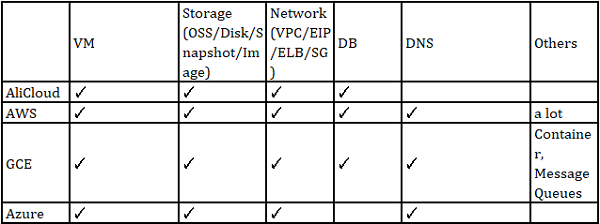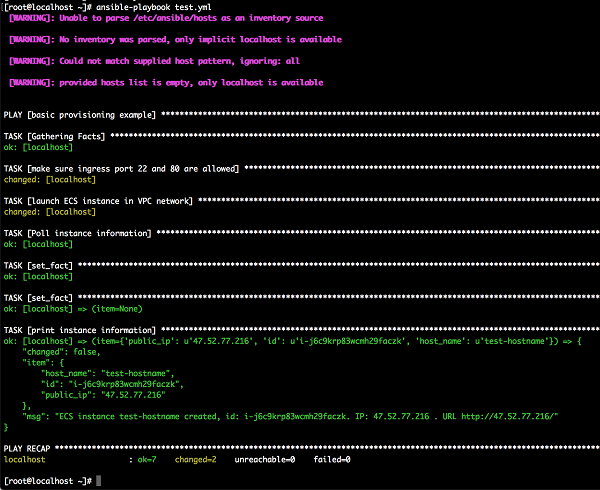By Philip Choi, Solutions Architect
This article will show you how to create Alibaba Cloud resources using Ansible through the Ansible Alicloud Module.
Ansible is one of the DevOps tools that is available in the market and widely being adopted among developer and operators. This document will describe how one can provision Alibaba Cloud Resources by using Ansible, such as creating an Elastic Compute Service (ECS) instance by using an Ansible playbook.
In general, Alicloud provides 4 ways for user to manage their cloud resources, namely Web Console, CLI, language-specific SDK, and RawAPI. Each of the method has its own pros and cons in terms of user-friendliness or automation capability. The following matrix describe each of the pros and cons of each methods. Ansible is something between CLI and SDK in terms of user friendliness as well as automation capability.
| Medium | User friendliness | Automation Capability | Product Coverage |
| Console | Anyone, intuitive | No way | All |
| CLI | Probably OK, for experienced sysadmin | Works, but not perfect | ECS/VPC/RDS/SLB/Storage |
| Ansible | Probably OK, for experienced sysadmin who can script | Better than CLI and more manageable | ECS/VPC/RDS/SLB/Storage |
| SDK | Probably OK, for experienced developer | Flexible, but quite a bit of effort | All |
| Raw API | Not user friendly at all | Very capable, but extensive effort | All |
As mentioned Ansible is one of the DevOps tools being widely used in the IaaS automation space. It allows sysadmins or developers to maintain their infrastructure as a code, supporting IaaS from traditional vendors like VMware to modern cloud vendors like Alibaba Cloud. Below is a comparison matrix on Ansible's capability in supporting other cloud vendors in the market.

Here is the overview of setting up the environment. After it is done, we can then run the example to create a ECS instance through ansible.
Please refer to the official documentation for details. In my case, I am using a CentOS 7 server to install the Ansible. You can do so with the following command.
yum -y install \ https://dl.fedoraproject.org/pub/epel/epel-release-latest-7.noarch.rpm
yum -y install ansibleBy default Ansible doesn't ship with Alicloud module, in order to provision Alicloud resources we will need this module. To install the module, please follow the steps documented in https://github.com/alibaba/ansible-provider
Run the following command to install the module on a CentOS 7 machine.
yum -y install python2-pip
pip install ansible_alicloudPlaybook is the template which contains the resources that we want to create. You can find the example template from below url: http://philipchoi-test.oss-cn-hongkong.aliyuncs.com/example.yml
To run the playbook, use the following command
ansible-playbook $FILENAME.ymlHere is a simulation run.

And from the web console, we can see that the instance is created.

Also, as from our playbook, we defined installation of web server and creation of web page, we can now fetch the page too.

In case the node running the Ansible playbook have a major time lag, the following error may occur. To solve the problem, sync the clock with ntp server to avoid any time lag.
TASK [make sure ingress port 22 and 80 are allowed] ******************************************************************************************************************************************************
fatal: [localhost]: FAILED! => {"changed": false, "msg": "Error in get_all_security_groups: ECSResponseError: , HTTP Status: 400 Error:IllegalTimestamp The input parameter \"Timestamp\" that is mandatory for processing this request is not supplied. RequestID: 9FAC5E19-46E3-4A72-A879-422A691585BC,\nNone"}
to retry, use: --limit @/root/test.retryThis example will create one ECS instance (or multiple instance, depends how much number you put into the "count" variable in the playbook),. However, you will need to input your own:
- name: basic provisioning example
hosts: localhost
vars:
alicloud_access_key: YOUR_ACCESS_KEY_HERE # replace it with your Alicloud Access Key
alicloud_secret_key: YOUR_SECRET_KEY_HERE # replace it with your Alicloud Secret Key
alicloud_region: cn-hongkong # replace it with the region you plan to use
image: centos_7_02_64_20G_alibase_20170818.vhd # replace it with the image to use
instance_type: ecs.n4.small # replace it with the flavor type
vswitch_id: vsw-YOUR_VSWITCH_ID_HERE # replace it with the Vswitch ID
assign_public_ip: True # set to false in case you dont need public ip
max_bandwidth_out: 10
host_name: PREFERRED_HOSTNAME # hostname
system_disk_category: cloud_efficiency
system_disk_size: 50
internet_charge_type: PayByTraffic
group_id: sg-YOUR_SG_ID_HERE # replace with the security-group-id
sg_action: join
key_name: SSH_KEY_NAME # replace with the ssh key
count: 2 # number of instances to create
user_data: |
#!/bin/sh
yum -y install httpd
systemctl start httpd
echo "Server Up at $(date -R)!" | tee /var/www/html/index.html
tasks:
- name: make sure ingress port 22 and 80 are allowed
alicloud_security_group:
alicloud_access_key: '{{ alicloud_access_key }}'
alicloud_secret_key: '{{ alicloud_secret_key }}'
group_id: '{{ group_id }}'
alicloud_region: '{{ alicloud_region }}'
rules:
- ip_protocol: tcp
port_range: 22/22
source_cidr_ip: '0.0.0.0/0'
policy: accept
- ip_protocol: tcp
port_range: 80/80
source_cidr_ip: '0.0.0.0/0'
policy: accept
- name: launch ECS instance in VPC network
alicloud_instance:
alicloud_access_key: '{{ alicloud_access_key }}'
alicloud_secret_key: '{{ alicloud_secret_key }}'
alicloud_region: '{{ alicloud_region }}'
image: '{{ image }}'
system_disk_category: '{{ system_disk_category }}'
system_disk_size: '{{ system_disk_size }}'
instance_type: '{{ instance_type }}'
vswitch_id: '{{ vswitch_id }}'
assign_public_ip: '{{ assign_public_ip }}'
internet_charge_type: '{{ internet_charge_type }}'
max_bandwidth_out: '{{ max_bandwidth_out }}'
group_id: '{{ group_id }}'
key_name: '{{ key_name }}'
host_name: '{{ host_name }}'
#password: '{{ password }}'
user_data: '{{ user_data }}'
count: '{{ count }}'
instance_tags:
Name: created_through_ansible
register: status
- name: Poll instance information
alicloud_instance_facts:
alicloud_access_key: '{{ alicloud_access_key }}'
alicloud_secret_key: '{{ alicloud_secret_key }}'
alicloud_region: '{{ alicloud_region }}'
instance_ids: '{{ status.instance_ids }}'
register: all_instances
- set_fact:
instances_info: []
- set_fact:
instances_info: "{{ instances_info + [ { 'id': item.id, 'host_name': item.host_name, 'public_ip': item.public_ip }] }}"
with_items: "{{ all_instances.instances }}"
no_log: true
- name: print instance information
debug:
msg: "ECS instance {{ item.host_name }} created, id: {{ item.id }}. IP: {{ item.public_ip }} . URL http://{{ item.public_ip }}/"
with_items: "{{ instances_info }}This example task will create a VPC.
- name: create vpc
hosts: localhost
connection: local
vars:
alicloud_access_key: YOUR_ACCESS_KEY_HERE # replace it with your Alicloud Access Key
alicloud_secret_key: YOUR_SECRET_KEY_HERE # replace it with your Alicloud Secret Key
alicloud_region: cn-hongkong
state: present
cidr_block: 192.168.0.0/16
vpc_name: Demo_VPC
description: Demo VPC
tasks:
- name: create vpc
alicloud_vpc:
alicloud_region: '{{ alicloud_region }}'
state: '{{ state }}'
cidr_block: '{{ cidr_block }}'
vpc_name: '{{ vpc_name }}'
description: '{{ description }}'This example task will create a RDS.
- name: create rds instance
hosts: localhost
vars:
alicloud_access_key: <your-alicloud-access-key-id>
alicloud_secret_key: <your-alicloud-access-secret-key>
alicloud_region: cn-beijing
tasks:
- name: create instance
alicloud_rds_instance:
alicloud_access_key: '{{ alicloud_access_key }}'
alicloud_secret_key: '{{ alicloud_secret_key }}'
alicloud_region: '{{ alicloud_region }}'
state: present
engine: MySQL
engine_version: 5.6
instance_class: rds.mysql.t1.small
instance_storage: 30
instance_net_type: Internet
security_ips: 10.23.12.24/24
instance_charge_type: PostpaidThis example task will create a SLB.
- name: create server load balancer
hosts: localhost
connection: local
vars:
alicloud_region: cn-beijing
alicloud_access_key: <your-alicloud-access-key-id>
alicloud_secret_key: <your-alicloud-access-secret-key>
load_balancer_name: demo_slb
internet_charge_type: paybytraffic
state: present
tasks:
- name: create server load balancer
alicloud_slb_lb:
alicloud_access_key: '{{ alicloud_access_key }}'
alicloud_secret_key: '{{ alicloud_secret_key }}'
alicloud_region: '{{ alicloud_region }}'
load_balancer_name: '{{ load_balancer_name }}'
internet_charge_type: '{{ internet_charge_type }}'
state: '{{ state }}'An example skeleton to create VPC, RDS and ECS in one playbook (Notes, you will need to glue each of the above examples together to form one playbook)
- name: create server stack
hosts: localhost
connection: local
vars:
alicloud_region: cn-beijing
alicloud_access_key: <your-alicloud-access-key-id>
alicloud_secret_key: <your-alicloud-access-secret-key>
.. line skipped ..
tasks:
- name: create VPC
alicloud_vpc:
.. line skipped ..
- name: create RDS
alicloud_rds_instance:
.. line skipped ..
- name: create ECS
alicloud_instances:
.. line skipped ..How Does Taobao Implement Real-Time Product Selection with Real-Time Computing?

2,599 posts | 769 followers
FollowAlibaba Clouder - October 12, 2019
Alibaba Cloud Community - September 15, 2021
Hiteshjethva - August 28, 2020
Alibaba Clouder - August 31, 2020
Alibaba Clouder - April 2, 2019
Alibaba Clouder - April 19, 2019
Hi I keep getting this error when trying to provision via Ansible payload_myWKe2/__main__.py", line 561, in mainnAttributeError: 'ECSConnection' object has no attribute 'get_all_security_groups'n", "module_stdout": "", "msg": "MODULE FAILUREnSee stdout/stderr for the exact error", "rc": 1

2,599 posts | 769 followers
Follow ECS(Elastic Compute Service)
ECS(Elastic Compute Service)
Elastic and secure virtual cloud servers to cater all your cloud hosting needs.
Learn More Function Compute
Function Compute
Alibaba Cloud Function Compute is a fully-managed event-driven compute service. It allows you to focus on writing and uploading code without the need to manage infrastructure such as servers.
Learn More OSS(Object Storage Service)
OSS(Object Storage Service)
An encrypted and secure cloud storage service which stores, processes and accesses massive amounts of data from anywhere in the world
Learn MoreMore Posts by Alibaba Clouder
Start building with 50+ products and up to 12 months usage for Elastic Compute Service
Get Started for Free Get Started for Free
Raja_KT March 18, 2019 at 4:31 pm
Good sharing. Handy for all to copy and paste the code and make changes if necessary.